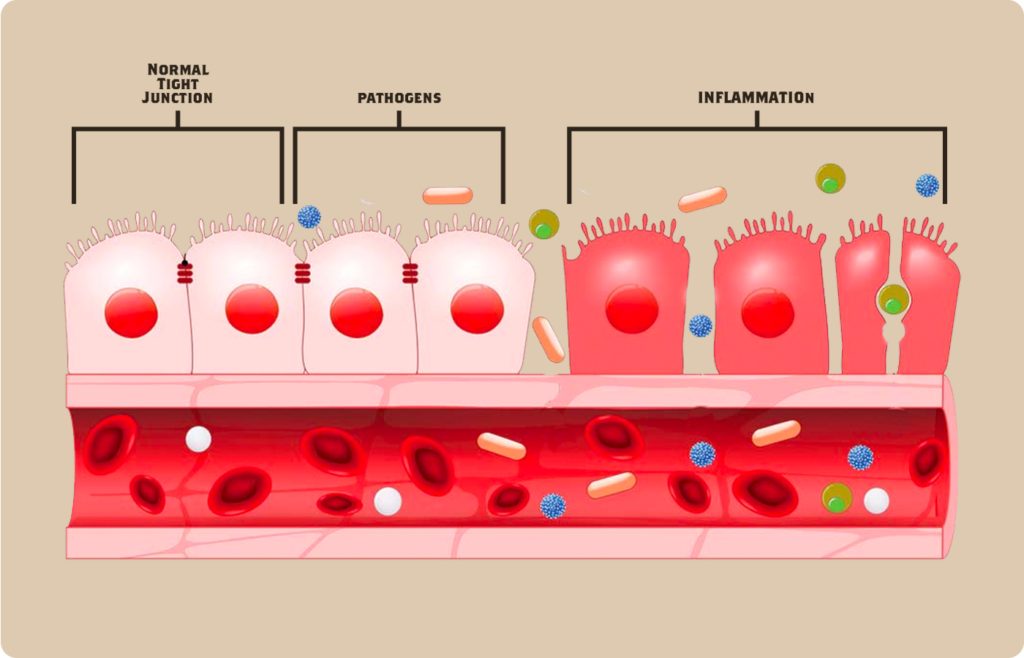PLEASE NOTE: The information in this blog is for educational purposes only. It is not a substitute for professional medical advice. Consult your healthcare provider if you’re seeking medical advice, diagnoses, or treatment.
Gut health is a hot topic nowadays. Rightfully so!
In the US alone, over 40 million people are estimated to have a digestive disorder. During 2018, this resulted in just under $120 billion in healthcare expenditures (1).
As you’ll see, gut health is critical for your overall health.
Most people’s environments, diets, and lifestyles drastically differ from what their ancestors experienced.
Unsurprisingly, digestive diseases are commonplace regardless of age, sex, or geographic location.
This blog highlights the basics of gut health, contributors to damaged gut health, and how to fix your gut using diet and lifestyle tools!
Gut Terminology 101
Before we dive into the details of this article, let’s briefly walk through some terms you’ll see throughout.
Microbiota: microorganisms (primarily bacteria) that live in or on your body. Diet is the primary determinant of your gut microbiota.
Gut Microbiome: the collection of genes from the microbiota found in your gut. Your mouth, skin, and nose have their own microbiomes as well. The gut microbiome varies greatly from person to person.
Leaky Gut: a breach in your intestinal lining that can allow food particles, bacteria, and toxins into your bloodstream.
Leaky gut is often associated with autoimmune conditions, food sensitivities, gas, bloating, and a host of other symptoms.

Gut Dysbiosis: an alteration in the gut microbiome generally associated with disease. Dysbiosis can be driven by numerous factors such as genetics, diet, environment, or infection.
Why is Gut Health So Important?
Your gut houses trillions of microbes, such as bacteria, yeasts, parasites, and protozoa, in a surface area of about 300 square meters (crazy, right?).
This internal environment is constantly in flux and starts taking shape before birth (2). The gut is an immune organ that protects your internal environment against external pathogens.
The impact of gut health is felt throughout the body as it’s closely connected to brain, liver, and immune system health (3).
A diverse gut microbiota is vital for brain structure and function (4). These microbiota also help to regulate the gut-brain axis, which impacts mood, behavior, and stress responses.
The gut contains an estimated 70% of immune cells and constantly contacts the immune system (5).
Gut health is also critical for thyroid function as microbiota influence the uptake of iron, iodine, selenium, and zinc (6).
Thyroid challenges such as Grave’s Disease or Hashimoto’s Thyroiditis often occur alongside intestinal issues such as Celiac Disease.
As you can see, your gut health is paramount!
Top Contributors to Poor Gut Health
What does it mean to have poor gut health?
This can look different for everyone, but common (and unsurprising) signs of gut issues include gas, bloating, constipation, diarrhea, and food allergies or sensitivities.
Even if you don’t have symptoms like gas or bloating, your gut may still not be functioning optimally. Poor gut health can be connected to autoimmune conditions, skin issues, obesity, diabetes, and mental health concerns (7).
For most individuals, the gut is now exposed to an onslaught of potential irritants and other factors that can alter gut composition:
Processed Foods (8)
Artificial Sweeteners (9)
Stress (10)
Alcohol & Smoking (11)
Household Chemicals (12)
Environmental Toxins (13)
Excessive Sanitation (14)
Genetics (15)
Antibiotic Usage (16)
Medications (17)
C Sections (18)
Whatever the causes, we believe the solution often lies in fostering a proper diet, environment, and lifestyle.
We’ll now dive into actionable items that you can take to tackle your gut issues or improve your already stellar gut health!
Diet Suggestions to Improve Gut Health
From our experience, many people have been able to restore their gut health and optimize digestion with simple dietary modifications.
1. Eliminate Common Gut Irritants
The human diet has changed dramatically over the past century. Highly-processed options have largely replaced whole foods (animal foods, fruit, veggies, etc.).
Not to mention, these highly-processed foods are often sprayed with pesticides, genetically modified, or contain artificial sweeteners and preservatives.
Unsurprisingly, many of these recent additions can negatively impact your gut.
As Dr. Paul discusses in this podcast episode, artificial sweeteners (sucralose, aspartame, stevia, monk fruit, etc.) can alter a person’s insulin sensitivity, glucose tolerance, appetite, and gut flora.
In most cases, consuming natural forms of sugar like maple syrup, agave syrup, molasses, and especially fruit and raw honey is better.
Another known contributor to intestinal permeability is the overconsumption of defense chemicals found in common plant foods (19,20,21).
Eliminating the most toxic plant foods is a crucial step in healing the gut, in our opinion. If you’re experiencing unpleasant symptoms, we suggest avoiding or limiting leaves, stems, nightshades, and seeds (nuts, grains, and legumes).
Some people may even benefit from avoiding FODMAPS for a short period. FODMAP stands for Fermentable Oligosaccharides, Disaccharides, Monosaccharides, and Polyols, all of which are carbohydrates that can be hard for some people to digest.
A low FODMAP diet helps 86% of patients with irritable bowel syndrome improve their symptoms (22).
High FODMAP foods one might temporarily exclude from an animal-based diet include honey, mangos, apples, peaches, soft bananas, dates, dairy, and more. These foods can be slowly introduced into the diet to see which ones are tolerated.
2. Completely Eliminate Seed Oils

Research has shown that increased linoleic acid intake—as found in seed oils—may negatively impact gut alpha diversity and play a significant role in developing inflammatory bowel disease (23,24,25).
Seed oils to look out for include corn, safflower, sunflower, soybean, cottonseed, canola, peanut, grapeseed, etc., all of which are found in processed foods and used, unfortunately, in many restaurants.
Look out for these oils under the “Ingredients” of food labels and avoid them at all costs! Instead, opt for butter, tallow, or ghee.
Additionally, do your best to avoid fatty pork (bacon), chicken, duck, turkey, or other monogastric animals primarily fed corn and soy diets.
Like humans, these animals will store excess linoleic acid (omega-6 polyunsaturated fatty acid) in their adipose tissue (fat cells), which is easily absorbed by our bodies when consumed (26,27).
3. Prioritize Grass-Fed, Grass-Finished Meat & Organs
These are some of the most nourishing foods on the planet, and you can get nearly every vitamin and mineral you need to perform your best daily.
Animal foods like muscle meat, organs, eggs, seafood, and dairy products contain various vitamins, minerals, growth factors, and peptides vital for gut health (28).
To highlight a few vitamins and minerals…
Zinc can reduce the permeability of the gut barrier. Inadequate zinc levels may negatively impact the diversity of the gut microbiome (29).
The function of the intestinal barrier can be improved by Vitamin A (30). Transportation of this vitamin throughout the blood also depends on zinc.
Selenium is a trace mineral that can help glutathione (the body’s master antioxidant) regenerate. Glutathione is necessary for gut function and protection.
B Vitamins help the body detoxify and eliminate foreign substances. Vitamin B12 deficiencies are common in those with SIBO, celiac disease, or IBD.
To easily obtain these nutrients, we suggest incorporating fresh organs. These can be found at many grocery stores (often in the frozen section), butcher shops, or from local farmers.
If you’re unable to find fresh organs or can’t stand the taste, Gut & Digestion is a great alternative aimed at improving digestive health.
4. Introduce Gut-Healing Foods
Following a carnivore or animal-based diet can shift gut bacteria in the right direction. Still, this is often not enough to cultivate a diverse microbiome or fully restore gut health.
In our experience, the best contributions to optimal gut health include bone broth, raw milk, and fermented foods.
Please note: Not everyone can tolerate all of these foods right away. If you decide to give these foods a try, start small and work your way up gradually. Moving too quickly can often result in unnecessary discomfort.
Bone broth: Few foods are more beneficial to the gut than high-quality bone broth. Bone broth is a fantastic collagen source, crucial to maintaining a robust intestinal epithelium (31).
It also provides essential minerals that play countless roles in our bodies, including glutamine, calcium, phosphorus, magnesium, sulfur, sodium, and potassium.
Unfortunately, most store-bought broth brands make their products with veggies, spices, or other potentially problematic ingredients. We always suggest making bone broth at home when possible.

Raw Milk: In our opinion, raw, unpasteurized milk from grass-fed cows is one of the few things on this planet that is truly worthy of being called a “superfood.”
It provides fat- and water-soluble vitamins in their most bioavailable forms (32) while also containing enzymes, bacteria, and unique peptides that can improve digestion, microbial diversity, and overall health (33,34).
Unfortunately, conventional pasteurization kills the beneficial bacteria and denatures the enzymes and amino acids typically found in milk, which may strip away its natural healing capacity and compromise digestibility (35).
To find raw milk in your area, check out RealMilk.com or GetRawMilk.com to use their Raw Milk Finder tools.
Fermented foods: Naturally fermented dairy products, veggies, fruit, etc., are some of the only foods that significantly help promote healthy alpha diversity of the gut, which is a crucial step in healing leaky gut (36). Fermented foods can be a source of naturally occurring probiotics.
We suggest starting with fermented dairy products (grass-fed yogurt, kefir, sour cream, cottage cheese, etc.) before incorporating fermented veggies, which can irritate those with sensitive guts.
When consuming fermented veggies, choosing products made without vinegar or lactic acid is vital—both are used to shortcut the fermentation process.
Forgoing natural fermentation means the veggies are not detoxified, and the finished product does not offer the same health benefits as traditionally fermented veggies.
Sauerkraut is an excellent option, as are pickles. Don’t forget to drink the juice!
Simple Lifestyle Suggestions to Support Gut Health
Basic lifestyle habits can also improve your gut health!
1. Prioritize Sleep & Recovery
Optimizing your sleep environment is crucial for healing, hormones, gut health, and more (37,38,39)!
Being consistent with bedtime, turning off devices 1-2 hours before sleep, dimming the lights, and even wearing blue-light-blocking glasses can all be helpful (40).
Consistent, quality sleep is vital for your body to heal, recover, and build muscle (41).
Our main suggestion is to ensure enough bone broth and connective tissue in your diet. These foods contain an amino acid called glycine. Glycine is a neurotransmitter in the brain that lends itself to proper relaxation and deep sleep (42).
While proper sleep habits can be a challenge nowadays, there are dozens of methods for naturally improving your sleep quality.
2. Stay Active

It is essential to complete some level of physical activity daily. Exercise may benefit the composition of gut microbes (43).
The minimum suggestion we give is two or three 10-minute walks pre/post-meals. Bonus points for adding in some weights for strength training (44)!
3. Get Sun Exposure
Remember to get outside, play in the sun, and reconnect with nature!
Getting sun is one of the best things you can do to improve your gut health, as sun exposure favors the gut microbiome (45). Vitamin D is known to promote intestinal health (46).
Sun exposure can also help your body enter its natural circadian rhythm cycle, which promotes sleep (47), recovery, muscle growth, and weight loss.
4. Manage Stress
Believe it or not, stress levels significantly affect gut health (48,49,50,51).
Stress is a major risk factor for developing various diseases impacting the gastrointestinal tract (52).

We challenge everyone to engage in some sort of stress management activity.
Meditation, prayer, sitting outside and connecting with nature, gardening, or even learning a new skill can all be enjoyable ways to reduce stress.
5. Identify Root Causes
It could be worth working with a professional if you’re already consistent with your diet and lifestyle but are still experiencing significant discomfort.
Many gut challenges like IBS, IBD, and SIBO can be connected to deeper issues.
Providers can run urine or stool tests to dig deeper into any root causes, such as heavy metals, mold, parasites, Lyme disease, and other environmental toxins.
These are incredibly common today, yet they can fly under the radar.
If needed, check out the Society of Metabolic Health Practitioners, where you can find physicians from all around the globe who understand the immense value of making animal foods the center of the diet.
Another popular option is IFM Find a Practitioner for a functional medicine approach.
6. Minimize Exposure to Toxins
Just as the average diet has changed dramatically, so has the average person’s exposure to toxins.
Toxic metals, organic pollutants, and endocrine disruptors are pervasive in food, drinking water, air, and personal care products (53, 54).
The gut is susceptible to stressors, so these exposures can contribute to gut dysbiosis and autoimmunity.
To help offset the effects:
- Use air and water filters in your home.
- Choose natural cleaning and personal care products, glass and stainless steel, and clothing and bedding made from organic cotton, hemp, or bamboo, free from parabens and synthetic fibers (55). Check out Dr. Paul’s video on environmental toxins for more info.
- Choose organic produce.
- Eliminate alcohol and tobacco products.
- Engage in regular detoxification practices such as exercise and sauna sessions.
Better Gut, Better You
Gut health is closely related to your brain, liver, thyroid, and immune system function. Not to mention, these issues can be debilitating to deal with!
Unfortunately, gut irritants are plentiful in modern diets and environments.
These irritants are commonly found in processed foods, household chemicals, certain medications, and other lifestyle staples.
While true healing doesn’t happen overnight, it’s possible to dramatically improve your digestive health based on daily decisions around diet and lifestyle!
Subscribe to future articles like this: